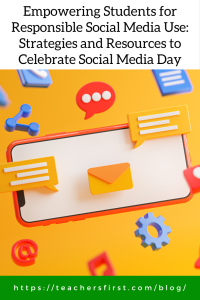June 30 is Social Media Day and is an excellent time to consider options for providing students with the tools for responsible use of social media. With over 4.9 billion active users worldwide and teens spending an average of 3 hours daily on social media, it is vital to equip students with the necessary skills and knowledge to navigate the digital world safely and effectively.
Understanding Social Media: Defining and Examining Students’ Daily Usage
As a starting point, it is worthwhile to take the time to define social media for our students and understand how they use it daily.
- AnswerGarden (reviewed here) is an easy-to-use tool as you begin your discussions and obtain feedback on students’ viewpoints and understanding of social media. Adjust the settings to fit your needs; answer options include choices for twenty or forty-character responses. Use your students’ responses as a starting point to identify and define the term social media and gather feedback on how your students interact on social media.
- See how easy it is to create word clouds and collect information by adding your response to this AnswerGarden question.
Promoting Discussion: Exploring the Pros and Cons of Social Media
After using the AnswerGarden responses as an introduction to social media, ask students to share their ideas on the pros/cons of social media.
- IdeaBoardz (reviewed here) is an online resource for quickly creating digital collaborative whiteboards. Use the format option to create a pro/con whiteboard, then ask students to add sticky notes with their ideas on the pros and cons of social media.
- Here is an example of a whiteboard created with IdeaBoardz to share ideas on the pros and cons of social media. Give it a try! Add your thoughts by clicking one of the plus signs to add a sticky note, then type your response.
Resources for Teaching Responsible Social Media Use
Using students’ responses to AnswerGarden and IdeaBoardz activities offers the opportunity to evaluate student understanding of social media and provides perspective on information to include in upcoming lessons. Take advantage of some of the excellent online resources that teach responsible use of social media:
- Let’s Talk About: Social Media Practice Spaces:
- This blog post by Dr. Ruth Okoye offers many suggestions for no-tech social media practice spaces. Dr. Okoye states, “Practice spaces can allow our students to learn the skills they need to without worrying about exposing them to adult social media.”
- Be Media Wise – Lessons to Teach Media Literacy (reviewed here), is appropriate for grades 6-12:
- Many lesson topics include fact-checking information, finding the missing context for misinformation, and detecting deep fakes.
- Lessons begin with a short video.
- Include support materials for students and teachers that include background reading and related vocabulary
- Correlated to standards, sign in to view specific state standards
- Many lesson topics include fact-checking information, finding the missing context for misinformation, and detecting deep fakes.
- My Social Media Life (reviewed here) is appropriate for grades 6-9:
- Forty-five-minute lesson plan
- Includes slides, video, take-home resources, and more, including extension activities
- Forty-five-minute lesson plan
- Social Media Test Drive (reviewed here) is appropriate for grades 4-12:
- Students practice online skills in social media simulations provided within modules offering a variety of content
- Modules use a format of learn, practice, explore, and reflect to present lessons on social media skills
- Topics include how to create safe accounts, shape a positive digital footprint, healthy social media habits, and more
- The Achievery (reviewed here) is appropriate for all grades:
- Select digital literacy lessons available for all grade levels
- Use the provided filters to narrow down by topics and standards
- Although there isn’t a specific content label for social media, digital literacy options that include social media are available, starting with the 5th-grade activities.
- Checkology (reviewed here) is appropriate for grades 5-12:
- Visit the Explore link to find many standards-aligned lessons
- Topics include Making Sense of Data, Misinformation, and Understanding Bias
- Choose any lesson to view a preview, register for a free account to access all of Checkology’s free content, and share with students.
- Learn more strategies and gather ideas by watching this OK2Ask archive: Social Media Literacy: Purposeful Practice in Every Classroom.
Fostering Positive Social Media Culture
As you recognize Social Media Day, encourage open discussion and collaboration among students to promote a more positive and supportive social media culture. For example, assign group activities where students work together to create social media campaigns that promote positive messages or support a social cause. This will help students develop essential teamwork and communication skills while promoting responsible social media use.
By offering purposeful lessons that integrate content and the real-life world of students’ social media use, we can help students develop the skills and knowledge they need to use social media responsibly. As an added benefit, students learn how to identify and avoid cyberbullying, fact-check information, and maintain a positive digital footprint.
What suggestions and resources do you use to prepare for Social Media Day and to teach social media skills? Share your ideas in the comments section as we all learn together.


